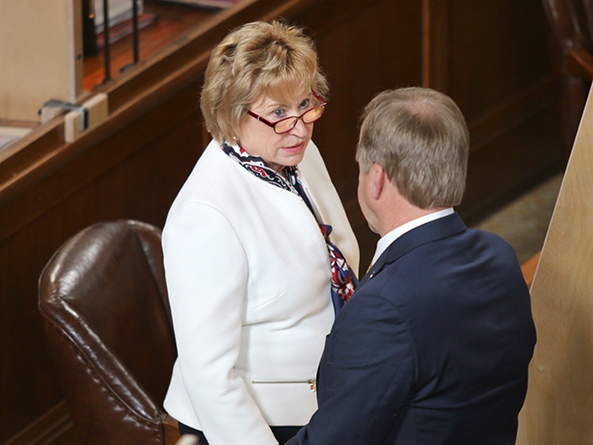Tax credit for private school scholarship contributions, child care stalls
A bill that would create a tax credit scholarship program for private school students stalled on general file April 28 after a failed cloture motion.
LB364, introduced by Elkhorn Sen. Lou Ann Linehan, would allow individuals, passthrough entities, estates, trusts and corporations to claim a nonrefundable income tax credit of up to 50 percent of their state income tax liability on contributions they make to nonprofit organizations that grant scholarships to students to attend private school.
Only Nebraska residents would be eligible for the scholarships, which could be used to pay tuition and fees at a qualifying privately operated elementary or secondary school in Nebraska.
Students would be eligible for the scholarships if, among other requirements, they are a dependent member of a household with a gross income that does not exceed the eligibility guidelines for reduced-price meals under the National School Lunch Program.
Linehan said the bill would help close an opportunity gap between white and minority students by helping more low-income families send their children to private school. Currently, she said, school choice is a privilege for wealthy and middle-class families who can afford to live in a good public school district or pay private school tuition.
“In America, a child’s opportunity for an education should not be determined by a family’s income or ZIP code,” Linehan said.
As introduced, LB364 would allow the state Department of Revenue to grant $10 million in credits in 2022. After that, if at least 90 percent of the credits in any given year are claimed, the annual limit would increase by 25 percent.
A pending Revenue Committee amendment instead would limit the total amount of credits available each year to $5 million.
The amendment also includes the amended provisions of LB531, introduced by Albion Sen. Tom Briese.
Under his proposal, taxpayers who make a qualifying financial contribution to certain child care and early childhood education programs in Nebraska could apply for a nonrefundable income tax credit equal to a portion of the contribution.
The contributions would have to promote or enhance quality child care and early childhood education programs, which Briese said are “critical” to Nebraska’s workforce and economic development.
“As we try to attract a skilled workforce to our communities, the presence of quality early childhood [programs] is crucial,” he said. “Young families want to locate where they have access to early child care.”
An eligible child care or early childhood education program would have to be enrolled in the quality rating and improvement system developed under the Step Up to Quality Child Care Act and meet other requirements.
Individuals, estates, trusts and corporations could claim the credit, which could not exceed $25,000 per taxpayer in any single year. Up to $5 million in credits would be available each year.
Sen. Justin Wayne of Omaha supported Linehan’s proposal. He said the achievement gap for Black students in the Omaha Public Schools district has grown over the past decade and that Nebraska’s public school system does not offer parents true choice because of limits on option enrollment.
“While [the] public school system continues to operate in a way that neglects and outright harms the education of Black children, what’s amazing is we are the same people who are standing up to block the choice that parents want,” Wayne said. “I believe that it’s unfair, unjust and just flat-out wrong to not give parents a choice.”
Omaha Sen. Terrell McKinney opposed LB364, saying it would not address the underlying factors that cause the achievement gap.
“Giving a scholarship does not erase that the kid is living in poverty, that they have to go home to places where the water isn’t running, the lights are off,” he said. “Yes, education is important, but how could you learn if you’re living in poverty, if you’re going to sleep hungry?”
Also in opposition was Sen. Megan Hunt of Omaha. She said the measure primarily would benefit wealthy donors and that a nondiscrimination provision in the committee amendment is “lacking.”
She introduced an amendment that would prohibit a scholarship granting organization from discriminating against students on the basis of race, color, religion, national origin, ancestry, citizenship status, gender, sexual orientation, gender identity, disability or special education status.
Bennington Sen. Wendy DeBoer also opposed Linehan’s proposal. Under LB364, she said, those who donate to scholarship granting organizations would receive a much larger tax benefit than those who contribute to other charitable causes.
“The problem isn’t the program that these dollars are going to,” DeBoer said. “It’s that this is a kind of tax loophole my constituents asked me to come down here and not create.”
Linehan offered to amend the bill on select file to reduce the value of the credit, cap the amount each individual or business could contribute and end the program after five years.
After eight hours of first-round debate, Linehan filed a motion to invoke cloture, which would end debate and force a vote on LB364 and any pending amendments.
The motion failed on a vote of 29-18. Thirty-three votes were needed. A failed cloture motion results in debate on a proposal ceasing for the day. The bill is unlikely to be placed on the agenda again this session.


